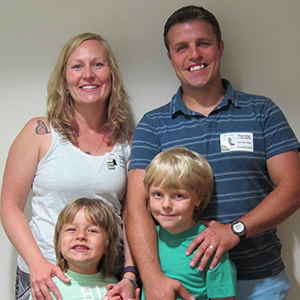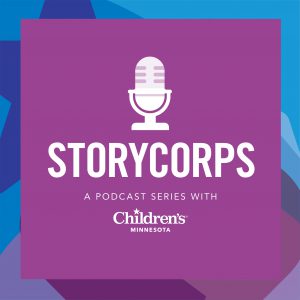Hemophilia: Amy and Johnathan’s story


About this episode
Amy and Johnathan discuss the similarities and differences in raising their two sons- one with a hemophilia diagnosis and one without.
Topics:
- Family history
- Premature delivery
- Diagnosed with circumcision
- Religious faith
- Postpartum Depression
Transcript
Amy: It was exciting to think about becoming parents for the first time. My pregnancy with Owen went pretty well up until like the middle, towards the end, with some preterm labor and bedrest, and then he had to be born via C-section at 34 weeks. And then with Wyatt, he came out, and I was really surprised when he came out! I was just kind of taken back by the fact that I didn’t think that he looked like his brother. Our first son, Owen does not have hemophilia. I have a family history of hemophilia, knowing that my mom is an effective carrier, a mild hemophiliac, but I was tested in the 80s, but they only tested my factor levels and said that I was not a carrier, so I never really got involved.
Johnathan: Your mom doesn’t do much, only if she’s got the big procedures. She doesn’t factor or anything like that. Her daily life is never really affected. Then the next closest people would be your great uncles.
Amy: Yeah, some great uncles. My grandma, seven of her nine brothers had hemophilia, which, even at the time, I don’t think they knew that. Like I said, I didn’t bother to really learn anything about it. It wasn’t on our radar at all. When Wyatt was born, he was almost two weeks older than Owen, so we just assumed that he would do really well, and he came out doing fine, and then ended up having some respiratory distress, so they took him to Children’s, because he wasn’t born here. And then it wasn’t until day six, when we brought him back to our hospital that I work at, to get a circumcision, that we found out that he had hemophilia then, because he had his circumcision and everything went pretty well, and then we brought him home, and he slept for a little bit, and then I went to change his diaper, and it was a diaper full of blood. So, as terrifying as that sounds, it was a quick call over to the clinic, and because I work for the hospital and clinic, I could speak directly to the doctor and say, ‘We’re coming in. This isn’t normal.’ So we brought him in, and our doctor, was very visibly shaken, so we were like, ‘I don’t know what’s going on,’ and even then, hemophilia didn’t cross my mind. I was thinking like…what happened during the circumcision. What happened with the circumcision? Something’s wrong! So then we got an ambulance ride back to Children’s Hospital again, and once we were here, and they kind of found out a little bit about our history, I think everybody else was kind of thinking right off the bat that’s what it is. So he had a circumcision at like 9 in the morning, and they were waiting for his levels to come back, and because it takes a while, they gave him some fresh frozen plasma, some fluid boluses and some blood, and then finally at 9 p.m., 12 hours later, they gave him the factor, and that’s when he finally stopped bleeding. It was pretty scary, I think probably one of the scariest time in my life.
Johnathan: Yeah, Absolutely
Amy: And I think, in the beginning, because I hadn’t bothered to do any research on it, it was just like – you have no idea when you get a chronic illness diagnosis, the worst things go through your head. I think the scariest part was he, at one point in time, turned super pale, and I thought, ‘Oh my gosh, is my baby going to die?’ but he responded well to all the medications and did very well. When we got the diagnosis, I was kind of crushed in the beginning, because I didn’t have any idea what it was going to mean for our lives.
Johnathan: Yeah, just having the two boys, I just pictured them being in sports together and we’re in a small town, so I had the dream of ‘Oh the Grant brothers, oh no!’ and you’ve got to play them in sports. And I was a wrestler, so ‘Oh no, the Grant brothers! We gotta wrestle one of the Grant brothers.’ I just had those grand ideas most fathers have of their kids in sports and doing well. And then, yeah, well then, I guess I can’t do that, and now what are we going to do? There are other avenues and other things that they can be known for, the good and the bad.
Amy: I don’t know if it was before or after we talked to her. I was sitting in the room alone with Wyatt, and I’ve always been a Christian, but my faith hadn’t been super important to me up until that point. I just had this really like moment with God, where it was like flashes of, things that he has provided me with to take care of this child. That was pretty amazing to me, that everything in my life has prepared me to take care of this baby that has a special need. So I felt like He was saying, I prepared you for this. You’ve got it; you’re good.’ Not saying that then it was like, ‘Oh, I’m good from there on out,’ but it was, at that time, a little moment of peace, like a little calm in the storm to feel like alright, I’m prepared for this. But like for me, bringing him home and being postpartum and having postpartum emotions, like most women do, I was probably dangerously close to the postpartum depression line, just because I just felt like really I didn’t know what to do with my baby. I was still kind of afraid that I was going to hurt him or break him. Just was just kind of hard initially. I think the first couple of weeks it was just really hard to still wrap my head around the idea of ‘what’s life going to be like?’ One thing that was super beneficial, though, was when they set me up at the clinic with another family, and they have two boys as well, one with hemophilia and one without. so I got to talk with her, and that was amazing to hear another mom say, ‘My kid is totally normal! He’s fine. He can do this; he can do that. If you saw him, you wouldn’t even know. He’s totally normal; he lives a totally normal life.’ So that was really beneficial, and that’s one thing that I wish that all new diagnosed families could be in touch with and see immediately off the bat, because it’s hard when you’re in that really scary place. It’s hard to know what to do, who to grasp out to and make any effort to reach out to anybody to sort of have somebody else reach out to you and say, ‘Let’s go do this and then I can kind of tell you about it,’ was really very helpful.
Johnathan: We were given all the information in the pamphlets, but going through that information at that time, was just like, ‘No, I just got told about this.’ It was too much to me to actually read it and process it.
Amy: And it’s kind of empowering as a parent to eventually start to feel like you can watch your child and know. You know your child best, and to have the confidence and I can watch him; I know if it’s bad, and not having to call the clinic.
Johnathan: Every single time.
Amy: Like when he was little, it was like, ‘Oh, is this okay? Oh my gosh, he tipped over. He was sitting on the floor and he tipped over. Is that okay? Where now it’s like, ‘Oh, whatever. He rolled off the bed; it’s fine. He’s totally fine.’
Johnathan: His brother can check him; he’s okay.
Amy: And I think another helpful thing for me was social media. I mean, that’s been a huge thing that I think is so nice for families, too. We’re pretty lucky about having lots of families around here, but some people are pretty isolated, so to be able to be on social media and find other hemophiliacs around the world to talk to and bounce things off of. With that, though, you come across a lot of different providers have different philosophies and treatment, and parents have different philosophies on how they’re going to treat and raise their kids, so you find extremes that people are really anti-prophy.
Johnathan: Bubble boys.
Amy: Yeah, like bubble boys where they don’t let their kids do anything. What do you think is the biggest challenging between raising our first son, who is not a hemophiliac, and our second son, who is?
Johnathan: Just pushing through the stereotypes of ‘Oh, he can’t do that.’ If he’s done with sports, he’s done with sports, but he still likes to play soccer. I can kick the ball with him.
Amy: If I could go back and do a little bit over, or if I could encourage other parents, is that I think we were a little like, ‘Don’t touch the baby,’ with the older brother. Not literally don’t touch him, but a little bit like ‘Be so extra careful with the baby. You’re going to hurt the baby,’ that it kind of ended up coming back to us as, when the baby was a little bit older, as like him having the attitude of ‘You can’t hurt me, but I can hurt you.’
Johnathan: Yeah, it’s not just the diagnosed one, it’s the whole family. Again, going back to the team; it’s a team effort.
We wish to extend our thanks to the families who have shared their story here about the impact of living with hemophilia and sickle cell disease. We would also like to thank the many who worked on this project:
The Children’s Minnesota StoryCorps Legacy Team:
Eddie Gonzalez, Jocelyn Bessette Gorlin, Susan Kearney, Stephen Nelson, Margaret Heisel-Kurth, Stephanie Davis, Angela Blue, Elizabeth McDonough, Jill Swenson and Alisa Linne.
Special thanks to:
Stephanie Moua, Hamdi Hussein, Sadia Farah, Fatima Ali, Caillyn Costello, Suzanne Lehman, Suzan Ulrich, D'Ann Urbaniak Lesch, Justin Nelson, Allison Albright, Marvin Holmes-Leopold, Jose Rodriguez and Mitch Hare.
Minneapolis Institute for Production and Recording:
Jose Rodriguez and Mitch Hare.